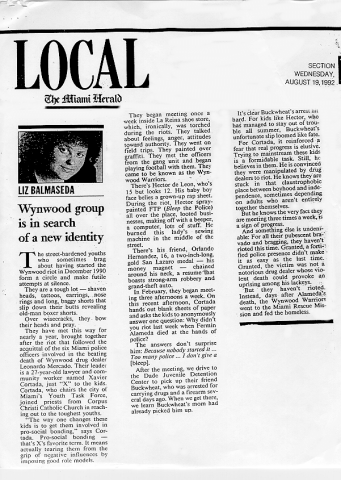The Miami Herald
August 19, 1992
By Liz Balmaseda

The street-hardened youths who sometimes brag about having started the Wynwood riot in December 1990 form a circle and make futile attempts at silence.
They are a tough lot — shaven heads, tattoos, earrings, nose rings and long, baggy shorts that slip down their butts revealing old-man boxer shorts. Over wisecracks, they bow their heads and pray.
They have met this way for nearly a year, brought together after the riot that followed the acquittal of the six Miami police officers involved in the beating death of Wynwood drug dealer Leonardo Mercado. Their leader is a 27-year-old lawyer and community worker named Xavier Cortada, just “X” to the kids. Cortada, who chairs the city of Miami’s Youth Task Force, joined priests from Corpus Christi Catholic Church in reaching out to the toughest youths.
“The way one changes these kids is to get them involved in pro-social bonding,” says Cortada. Pro-social bonding — that’s X’s favorite term. It means actually tearing them from the grip of negative influences by imposing good role models.
They began meeting once a week inside La Reina shoe store, which, ironically, was torched during the riots. They talked about feelings, anger, attitudes toward authority. They went on field trips. They painted over graffiti. They met the officers from the gang unit and began playing football with them. They came to be known as the Wynwood Warriors.
There’s Hector de Leon, who’s 15 but looks 12. His baby boy face belies a grown-up rap sheet. During the riot, Hector spray- painted FTP (Bleep the Police) all over the place, looted businesses, making off with a beeper, a computer, lots of stuff. He burned this lady’s sewing machine in the middle of the street.
There’s his friend, Orlando Hernandez, 16, a two-inch-long, gold San Lazaro medal — his money magnet — chained around his neck, a resume that boasts strong-arm robbery and grand-theft auto.
In February, they began meeting three afternoons a week. On this recent afternoon, Cortada hands out blank sheets of paper and asks the kids to anonymously answer one question: Why didn’t you riot last week when Fermin Alameda died at the hands of police?
The answers don’t surprise him: Because nobody started it … Too many police … I don’t give a (bleep).
After the meeting, we drive to the Dade Juvenile Detention Center to pick up their friend Buckwheat, who was arrested for carrying drugs and a firearm several days ago. When we get there, we learn Buckwheat’s mom had already picked him up.
It’s clear Buckwheat’s arrest hit hard. For kids like Hector, who has managed to stay out of trouble all summer, Buckwheat’s unfortunate slip loomed like fate.
For Cortada, it reinforced a fear that real progress is elusive. Trying to mainstream these kids is a formidable task. Still, he believes in them. He is convinced they were manipulated by drug dealers to riot. He knows they are stuck in that claustrophobic place between boyhood and independence, sometimes depending on adults who aren’t entirely together themselves.
But he knows the very fact they are meeting three times a week, is a sign of progress.
And something else is undeniable: For all their pubescent bravado and bragging, they haven’t rioted this time. Granted, a fortified police presence didn’t make it as easy as the last time. Granted, the victim was not a notorious drug dealer whose
violent death could provoke an uprising among his lackeys.
But they haven’t rioted. Instead, days after Alameda’s death, the Wynwood Warriors went to the Miami Rescue Mission and fed the homeless.
All content © 1992 THE MIAMI HERALD and may not be republished without permission.